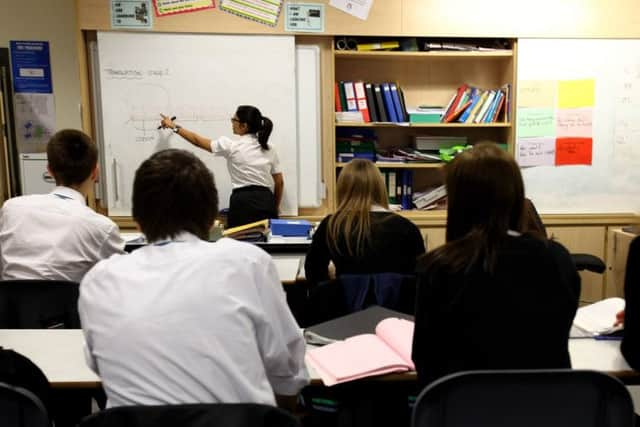Claim '˜school isn't free' as pupils miss out on subjects due to costs
Families are even running up debts with schools as they defer payments for course materials, equipment and school trips.
Scotland’s biggest teaching union has now called on the Scottish Government and councils to address the issue amid fears it undermines the principle of “equal opportunity for all” in Scotland’s schools.
Advertisement
Hide AdAdvertisement
Hide AdThere are also fears it could undermine the flagship Scottish Government ambition to drive down the attainment gap between deprived and affluent areas of Scotland.


The government last night said it was “not acceptable” to charge for core education needs.
It came as fresh research showed a “postcode lottery” in the Scottish school system as areas with similar deprivation levels see a major gulf in the achievement levels of pupils.
Holyrood’s education committee was told yesterday that many pupils are discouraged from choosing some subjects for further study amid concerns over the potential costs.
John Dickie, director of the Child Poverty Action Group in Scotland, said: “The reality is that too often education isn’t free; what’s offered in school isn’t free, pupils and families are being charged for it.”


Materials for courses were charged to students, particularly in home economics, art and design, technical studies and for theatre trips on English and drama courses, as well as rising costs for music tuition.
“There is real evidence of young people actually making subject choices influenced by cost,” Mr Dickie added.
Schools in some areas have scrapped costs and seen increased participation in the subjects affected.
Advertisement
Hide AdAdvertisement
Hide Ad“There’s two things: pupils are actually missing out on those subjects, not being able to participate, or their ability to enjoy those subjects, knowing that is causing a stress for them and their families to participate, is diminished.”
The EIS teaching union has previously raised concerns over the impact of charging.
A spokeswoman said: “Some families are accumulating ‘debt’ to the school because they are unable to pay.
“Not only does this carry stigma for the young people affected, it discourages them from choosing certain subjects for further study because they are aware of the associated costs and their family’s inability to meet them.
“The EIS has written to local authorities, MSPs and the Scottish Government recently on this matter, requesting that each plays their part in addressing such inequality within what is supposed to be a system of comprehensive education offering equal opportunity for all to participate and succeed.”
Nicola Sturgeon has declared that driving down the “attainment gap” in Scotland is her top priority as First Minister.
But new research by the Joseph Rowntree Foundation found a wide variation across Scotland even among pupils in deprived areas. Youngsters living in East Dunbartonshire were more than twice as likely to get five or more National 5 qualifications than youngsters from poorer areas of the Borders.
Jim McCormick of the Foundation told MSPs there are “very big variations in attainment”. He said: “It really does depend on where you go to school in Scotland as to how your fortunes currently look in terms of attainment.”
Advertisement
Hide AdAdvertisement
Hide AdA Scottish Government spokeswoman said charging pupils in “core” aspects of their schooling should not be happening.
“All children should expect to be able to access all subjects. It is not acceptable for schools to ask pupils to pay for a core part of their curriculum,” she said.
“Councils have a legal responsibility for providing an adequate and efficient education, suitable to the needs of every child. Within this settlement, sufficient resource should be made available to schools for supplies and equipment, with specific levels of funding for schools determined by individual councils.”
Local government umbrella body Cosla said the education of youngsters is “key” for all councils.
But a spokesman said: “The facts are that we are delivering services in a context of cuts to local authority budgets and a difficult financial climate.
“We will continue to prioritise children and young people services.”